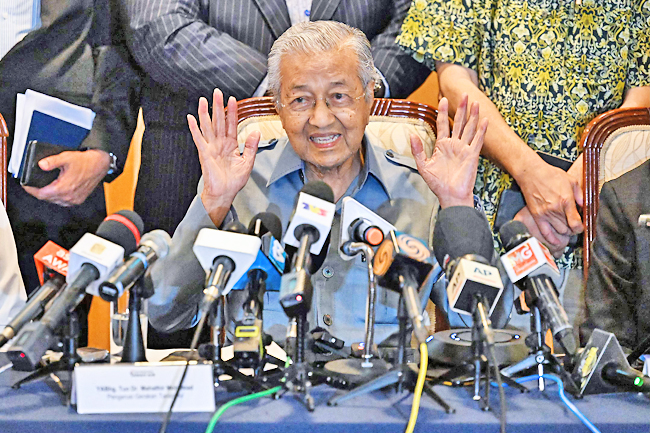CNA – The shocking defeat of former Malaysian prime minister Dr Mahathir Mohamad at Saturday’s general election risks overshadowing his legacy in transforming the nation’s economy, observers said.
They pointed to the 97-year-old’s efforts in taking Malaysia’s economy from being heavily dependent on agriculture to a more advance one involving industrialisation and manufacturing.
But the experts also acknowledged his role as a divisive figure, having implemented race-based policies and consolidated power in the former ruling party’s leadership – which has had ripples on the state of corruption in Malaysia today.
Dr Mahathir, who led the Gerakan Tanah Air (GTA) coalition in Malaysia’s 15th General Election (GE15), failed to defend his Langkawi seat – his first electoral defeat in 53 years.
He lost his deposit after finishing fourth in a five-cornered fight, which was won by Perikatan Nasional’s Mohd Suhaimi Abdullah.

“If you look at the physical landscape in and around Kuala Lumpur (KL), his name is written on it, from the Petronas Twin Towers to the Multimedia Super Corridor and so forth,” said Dr Francis Hutchinson, senior fellow and Malaysia Studies Programme coordinator at the ISEAS-Yusof Ishak Institute.
The Multimedia Super Corridor, announced in 1996, was Dr Mahathir’s plan to transform Malaysia into a knowledge-based economy.
Dr Hutchinson also said the election result was “quite ironic and difficult” for Malaysia’s longest serving prime minister, given his association with the state of Kedah and specifically, Langkawi.
“When he was prime minister the first time, actually after the KL federal territory, Kedah got a lot of development expenditure, and he was really the one kind of trying to develop Langkawi as an international destination. That was, I guess, behind the thinking of why he chose that seat,” Dr Hutchinson said.
Dr Serina Abdul Rahman, visiting fellow at ISEAS-Yusof Ishak Institute’s Malaysia Programme and Regional Economic Studies, also highlighted Dr Mahathir’s efforts in shifting the country’s economic focus from agriculture to industrialisation and manufacturing.
“I always remember him as the person who said, ‘If you don’t do the switch from farming and fishing, then you’re lazy’, because he was pushing through that move to factories,” she said.
He also supported the country’s New Economic Policy, a socioeconomic restructuring plan which emphasised race-based policies.
“He put into place, with other politicians at that time, this whole bumiputra policy, which has often been taken out of context,” said Dr Serina, referring to the policy for affirmative action for Malays in the country.
“He’s done a lot of good in developing Malaysia… But there have been some repercussions from that, that perhaps he also didn’t expect when he put it all into place,” she said.
The bumiputra policies left Malaysian society divided along racial lines.
One segment glad to witness Dr Mahathir’s loss “will probably be the Chinese community”, said Dr James Chin, professor of Asian Studies at the University of Tasmania.
“There are many people in the Chinese community who equate Mahathir with a period where they think they suffered most discrimination,” he said.
“All the discrimination policies against the non-Malays were instituted during his time. So I think a lot of the Chinese will say that yes, in some ways, it is the end of an era and we’re glad to see him out.”




